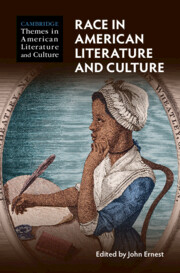Book contents
- Race in American Literature and Culture
- Cambridge Themes in American Literature and Culture
- Race in American Literature and Culture
- Copyright page
- Contents
- Contributors
- Acknowledgments
- Introduction
- Part I Fractured Foundations
- Chapter 1 American Empire
- Chapter 2 Synchronic and Diachronic
- Chapter 3 Protean Oceans
- Part II Racial Citizenship
- Part III Contending Forces
- Part IV Reconfigurations
- Part V Envisioning Race
- Part VI Case Studies
- Part VII Reflections and Prospects
- Index
Chapter 3 - Protean Oceans
Racial Uncertainty in Arthur Gordon Pym and Emmanuel Appadocca
from Part I - Fractured Foundations
Published online by Cambridge University Press: 26 May 2022
- Race in American Literature and Culture
- Cambridge Themes in American Literature and Culture
- Race in American Literature and Culture
- Copyright page
- Contents
- Contributors
- Acknowledgments
- Introduction
- Part I Fractured Foundations
- Chapter 1 American Empire
- Chapter 2 Synchronic and Diachronic
- Chapter 3 Protean Oceans
- Part II Racial Citizenship
- Part III Contending Forces
- Part IV Reconfigurations
- Part V Envisioning Race
- Part VI Case Studies
- Part VII Reflections and Prospects
- Index
Summary
This chapter analyzes the white supremacist fear of racial hybridity and scientific racism’s uncertain and contradictory construction of whiteness through a reading of Edgar Allan Poe’s Narrative of Arthur Gordon Pym of Nantucket (1837) and Maxwell Philip’s Emmanuel Appadocca, or Blighted Life: A Tale of the Boucaneers (1854). Both New World novels, respectively written in light of and in response to the Jacksonian Indian removal and the passing of the Fugitive Slave Law, articulate the fractured Black Atlantic world by representing and critically contesting Anglo-Saxonism’s cultural pathology. The essay shows how antebellum debates about the “racial” character of two different antiquities – ancient Egypt and the medieval Norse settlement of America – function as an imaginary filter for negotiating fears of racial hybridity and degeneration in the removal/antebellum present. Next to uncertainties as to the civilizational significance of writing, these literary works reveal a Black Atlantic literary counterdiscourse that explores the economic and social undercurrents of racial slavery – a form of labor whose continued existence depended on the incessant circulation of imaginary “scientific” constructions of a “natural” hierarchy within mankind.
Keywords
- Type
- Chapter
- Information
- Race in American Literature and Culture , pp. 41 - 56Publisher: Cambridge University PressPrint publication year: 2022

